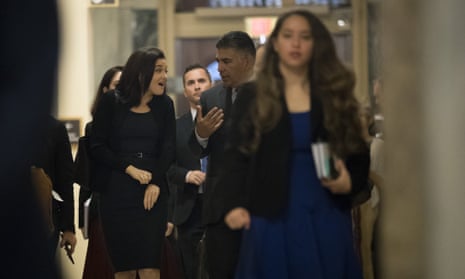Facebook owes the American people an apology for the way it handled Russia’s interference in last year’s presidential election, its chief operating officer said on Thursday.
“It’s not just that we apologize. We’re angry, we’re upset. But what we really owe the American people is determination” to do a better job of preventing foreign meddling, Sheryl Sandberg told the Axios news website during an interview in Washington.
She also told the website that her social network was not a media company. “At our heart we’re a tech company,” she said. “We don’t hire journalists.”
The live interview was the first by a senior Facebook executive since the company disclosed last month it had found some 3,000 politically divisive ads believed to have been bought by Russia in the months before and after the presidential campaign.
US intelligence agencies have concluded that Russia used cyber-enabled means in an attempt to help Donald Trump win the White House, an allegation the Kremlin and Trump have repeatedly denied.
Sandberg said ads linked to Russia trying to influence the US presidential election should “absolutely” be released to the public, along with information on whom the ads were targeting.
Previously, Facebook has declined to make the ads public, and Sandberg did not say when the company would do so.
The company disclosed last month that it had found ads linked to fake accounts – probably run from Russia – that sought to influence the election. Facebook says these ads focused on divisive political issues, such as immigration and gun rights, in an apparent attempt to sow discord among the US population. The ads included promoted events and amplified posts that show up in users’ news feeds.
Facebook has turned over the ads – and information on how they were targeted, such as by geography or to people with a certain political affiliation – to congressional investigators. Congress is also investigating Russia-linked ads on Twitter and Google.
Sandberg said Facebook had a responsibility to prevent the kind of abuse that occurred on its service during the election. She said Facebook hoped to “set a new standard in transparency in advertising”.
But she also said that had the ads been linked to legitimate, rather than fake, Facebook accounts, “most of them would have been allowed to run”. While the company prohibits certain content such as hate speech, it does not want to prevent free expression, she said.
“The thing about free expression is that when you allow free expression, you allow free expression,” Sandberg said.
The move comes as critics and lawmakers are increasingly calling for the regulation of Facebook and other internet giants.
Sandberg is meeting with elected officials in Washington this week ahead of a House hearing at which executives from Facebook, Twitter and Google are expected to testify.
Congressional committees and special counsel Robert Mueller are investigating Russian interference in the election, including whether there was any collusion between Trump associates and Moscow.
Sandberg is no stranger to Washington. Before her time at Google and later Facebook, she worked for Larry Summers, treasury secretary for Bill Clinton.
Sandberg said Facebook did not catch these ads earlier because it was focused on other threats, such as hacking.
Sandberg didn’t say whether she believes Facebook played a role in electing Trump as president, as critics have said it did by allowing the spread of fake news on its service.
She said only that the role Facebook plays in elections went “beyond any one campaign, any one country”.
The Associated Press and Reuters contributed to this report
